- Regulatory Status
- RUO
- Other Names
- Monocyte chemotactic and activating factor (MCAF), monocyte secretory protein JE, small inducible cytokine A2 (SCYA2)
- Ave. Rating
- Submit a Review
- Product Citations
- publications
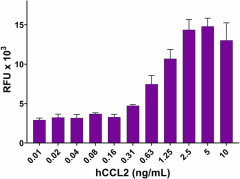
-

Recombinant human CCL2 (MCP-1) chemoattracts Baf3-mCCR2 transfectants in a dose-dependent manner. The ED50 for this effect is 0.3 – 1.8 ng/mL.
CCL2, also known as MCP-1, is a member of the CC ß chemokine family. It is widely expressed in endothelial cells, smooth muscle cells and monocytes in response to several atherogenic stimulants such as CD40 ligand, platelet derived growth factor (PDGF), interleukin-1β (IL-1β) and oxidized low density lipoprotein. Several recent in vivo studies have disclosed critical roles of MCP1 in atherosclerosis. In addition, MCP-1 has been implicated in monocytic infiltration of tissues during several inflammatory diseases, and has been implicated in macrophage-mediated tumor growth suppression in mice. CCL2 has been shown to have direct effects on tumor cells in an autocrine and paracrine fashion in multiple cancers, including breast, lung, cervix, ovary, sarcoma, and prostate. In addition, MCP-1 plays a key role in the regulation of MMPs during transmigration.MCP-1/CCl2 has been described as a new diagnostic marker and therapeutic target for progressive renal injury in diabetic nephropathy. Kidney epithelial cells, including glomerular podocytes and tubular cells make MCP-1 in response to high glucose and advanced glycation end products. MCP-1 promotes inflammation and progressive injury in diabetic kidneys. The importance of MCP-1 in the early development of diabetic nephropathy has been determined in animal models incorporating genetically deficient mice or therapeutic blockade of MCP-1 receptor (CCR2).
Product DetailsProduct Details
- Source
- Human MCP1, amino acids Gln24-Thr99 (NM_002982) was expressed in E. coli.
- Molecular Mass
- The 76 amino acid recombinant protein has a predicted molecular mass of approximately 8,685 Da. The DTT-reduced protein migrates at approximately 8kDa and non-reduced protein migrates at approximately 13kDa by SDS-PAGE. The N-terminal amino acid is Glycine.
- Purity
- Purity is >98%, as determined by Coomassie stained SDS-PAGE.
- Formulation
- 0.22 µm filtered protein solution is in 10 mM NaH2PO4 pH 7.2, 0.15 M NaCl.
- Endotoxin Level
- Less than 0.01ng per µg cytokine as determined by the LAL method.
- Concentration
- 10 and 25 µg sizes are bottled at 200 µg/mL. 100 µg size and larger sizes are lot-specific and bottled at the concentration indicated on the vial. To obtain lot-specific concentration and expiration, please enter the lot number in our Certificate of Analysis online tool.
- Storage & Handling
- Unopened vial can be stored between 2°C and 8°C for up to 2 weeks, at -20°C for up to six months, or at -70°C or colder until the expiration date. For maximum results, quick spin vial prior to opening. The protein can be aliquoted and stored at -20°C or colder. Stock solutions can also be prepared at 50 - 100 µg/mL in appropriate sterile buffer, carrier protein such as 0.2 - 1% BSA or HSA can be added when preparing the stock solution. Aliquots can be stored between 2°C and 8°C for up to one week and stored at -20°C or colder for up to 3 months. Avoid repeated freeze/thaw cycles.
- Activity
- Recombinant human CCL2 (MCP-1) chemoattracts Baf3-mCCR2 transfectants in a dose-dependent manner. The ED50 for this effect is 0.3 – 1.8 ng/mL.
- Application
-
Bioassay
- Application Notes
-
BioLegend carrier-free recombinant proteins provided in liquid format are shipped on blue-ice. Our comparison testing data indicates that when handled and stored as recommended, the liquid format has equal or better stability and shelf-life compared to commercially available lyophilized proteins after reconstitution. Our liquid proteins are verified in-house to maintain activity after shipping on blue ice and are backed by our 100% satisfaction guarantee. If you have any concerns, contact us at tech@biolegend.com.
- Product Citations
-
Antigen Details
- Structure
- Chemokine
- Distribution
-
MCP-1 (CCL2) is secreted by fibroblast, endothelial cells, smooth muscle cells, tumor cells, phytohemaglutinin stimulated mononuclear cells.
- Function
- MCP-1 induces migration of monocytes, memory/activated T cells, NK cells, myeloid dendritic cells, neutrophils, astrocytes, mesangial cells, and bone marrow endothelial cells. MCP-1 is induced by IL-1b, TNF, IFNg, PDGF, IL-4, MIF, and IL-17.
- Ligand/Receptor
- MCP-1 mediates its cellular effects primarily through CCR2 receptor
- Cell Type
- Hematopoietic stem and progenitors
- Biology Area
- Cell Biology, Neuroinflammation, Neuroscience, Stem Cells
- Molecular Family
- Cytokines/Chemokines
- Antigen References
-
1. Loberg RD, et al. 2007. Cancer Research. 67:9417-9424.
2. Gregory JL, et al. 2006. J. Immunol. 177:8072-8079.
3. Qui Z, et al. 2009. Immunology. 214:835-842.
4. Reichel CA, et al. 2009. Arterioscler Thromb Vasc Biol. ATVBAHA.109.193268v1
5. McQuibban GA, et al. 2002. Blood 100:1160-1167
5. Tesh GH, et al. 2008. Amm J Physiol Renal Physiol. 294:F697-F701. - Gene ID
- 6347 View all products for this Gene ID
- UniProt
- View information about CCL2 on UniProt.org
Related FAQs
- Why choose BioLegend recombinant proteins?
-
• Each lot of product is quality-tested for bioactivity as indicated on the data sheet.
• Greater than 95% Purity or higher, tested on every lot of product.
• 100% Satisfaction Guarantee for quality performance, stability, and consistency.
• Ready-to-use liquid format saves time and reduces challenges associated with reconstitution.
• Bulk and customization available. Contact us.
• Learn more about our Recombinant Proteins. - How does the activity of your recombinant proteins compare to competitors?
-
We quality control each and every lot of recombinant protein. Not only do we check its bioactivity, but we also compare it against other commercially available recombinant proteins. We make sure each recombinant protein’s activity is at least as good as or better than the competition’s. In order to provide you with the best possible product, we ensure that our testing process is rigorous and thorough. If you’re curious and eager to make the switch to BioLegend recombinants, contact your sales representative today!
- What is the specific activity or ED50 of my recombinant protein?
-
The specific activity range of the protein is indicated on the product datasheets. Because the exact activity values on a per unit basis can largely fluctuate depending on a number of factors, including the nature of the assay, cell density, age of cells/passage number, culture media used, and end user technique, the specific activity is best defined as a range and we guarantee the specific activity of all our lots will be within the range indicated on the datasheet. Please note this only applies to recombinants labeled for use in bioassays. ELISA standard recombinant proteins are not recommended for bioassay usage as they are not tested for these applications.
- Have your recombinants been tested for stability?
-
Our testing shows that the recombinant proteins are able to withstand room temperature for a week without losing activity. In addition the recombinant proteins were also found to withstand four cycles of freeze and thaw without losing activity.
- Does specific activity of a recombinant protein vary between lots?
-
Specific activity will vary for each lot and for the type of experiment that is done to validate it, but all passed lots will have activity within the established ED50 range for the product and we guarantee that our products will have lot-to-lot consistency. Please conduct an experiment-specific validation to find the optimal ED50 for your system.
- How do you convert activity as an ED50 in ng/ml to a specific activity in Units/mg?
-
Use formula Specific activity (Units/mg) = 10^6/ ED50 (ng/mL)







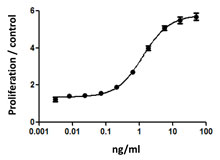
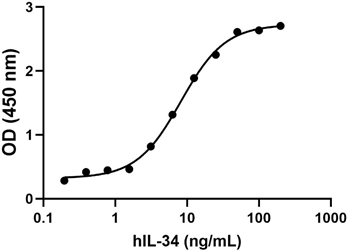
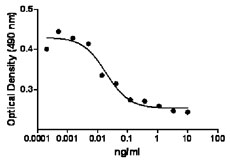
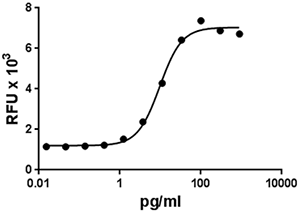



Follow Us